- Home
- Diana Wynne Jones
Hexwood Page 4
Hexwood Read online
Page 4
He came back to the path, carrying the stick. It was no longer a stick, but a staff, old and polished and carved with curious signs. He looked up at Ann and croaked out a remark at her.
She recoiled against the tree trunk. Oh my God! He knew I was there all along! And now she was the indecent one. Comes of climbing trees in a tight skirt. The skirt was rolled up round her waist. He must be looking straight up at her pants. And her long, helpless legs dangling down on either side of the branch.
The strange man below coughed, displeased with his voice, still staring up at Ann. His eyes were light, inside deep hollows. His eyebrows met over his nose, in one eyebrow shaped like a hawk flying. He was a weird-looking man, even if you met him in the ordinary way, walking down the street. You’d think, Ann thought, you’d run into the Grim Reaper.
“I’m sorry,” she said, high-voiced with fear. “I – I can’t understand a word you’re saying – and I don’t want to.”
He looked startled. He thought. Gave another cough. “I apologise,” he said. “I was using the wrong language. What I said was, I’ve no intention of hurting you. Won’t you come down?”
They all say that! Mum’s warning voice said in Ann’s head. “No, I won’t,” Ann said. “And if you try to climb up I shall kick you.” And she wondered frantically, How do I get out of this? I can’t sit up here all day!
“Well, do you mind if I ask you a few questions?” asked the man. As Ann drew breath to say that she did mind, very much, he added quickly, “I’ve never been so puzzled in my life. What is this place?”
Now he was getting used to talking, he had quite a pleasant deep voice, with a slight foreign accent. Swedish? Ann wondered. And he did have every reason to be puzzled. There seemed no harm in telling him what little she knew. “What do you want to ask?” she said cautiously.
He cleared his throat again. “Can you tell me where we are? Where this is?” He gestured round at the green distances of the wood.
“Well,” Ann said, “it ought to be the wood just beside Hexwood Farm, but it – seems to have gone bigger.” As he seemed quite bewildered by this, she added, “But it’s no use asking me why it’s bigger. I can’t understand it either.”
The man clicked his tongue and stared up at her impatiently. “I know about that. I could feel I was working with a field just now. Something near by is creating a whole set of paratypical extensions—”
“You what?” said Ann.
“You’d probably call it,” he said thoughtfully, “casting a spell.”
“I would not!” Ann said indignantly. She might look absurd and indecent sitting dangling in this tree, but that didn’t mean she was a moron! “I’m far too old to think anything so silly.”
“Apologies,” he said. “Then perhaps the best way to explain it is as quite a large hemisphere of a certain kind of force that has power to change reality. Does that help you?”
“Sort of” Ann admitted.
“Good,” he said. “Now please explain where and what is Hexwood Farm.”
“It’s the old farm on our housing estate,” Ann said. He looked bewildered again. The one eyebrow gathered in over his nose, and he leant on his staff to stare about him. Ann thought he seemed wobbly and ill. Not surprising. “It’s not a farm any more, just a house,” she explained. “About forty miles from London.” He shook his head helplessly. “In England, Europe, Earth, the solar system, the universe. You must know!” Ann said irritably. “You came here in a car this morning. I saw you – going into the farm with two other men!”
“Oh no,” he said, sounding faint and tired. “You’re mistaken. I’ve been in stass-sleep for centuries, for breaking the Reigners’ ban.” He turned and pointed a startlingly long finger at the chest half-buried in the bank. “Now you have to believe that. You were standing here, where I am now, when I came out. I saw you.”
This was hard to deny, but Ann was sure enough of her facts to try, leaning earnestly down from her branch. “I know – I mean, I did see you – but I saw you before that, early this morning, walking in the road in modern clothes. I swear it was you! I knew by the way you walked.”
The man below firmly shook his head. “No, it was not me you saw. It must have been a descendant of mine. I took care to have many descendants. It was – was one good way of breaking – that unjust ban.” He put a hand to his forehead. Ann could see he was coming over queer. The staff was wobbling under his hand.
“Look,” she said kindly, “if this – this sphere of force can change reality, couldn’t it have changed you, like it changed the wood?”
“No,” he said. “There are some things that can’t be changed. I am Mordion. I am from a distant world and I was sent here under a ban.” He used his staff to help him to the bank, where he sat down and covered his face shakily with one hand.
It reminded Ann of the weak way she had felt only yesterday. She was torn between sympathy for him and urgent worry about herself. Probably he was not sane. And her legs were going numb and needlish, the way legs do if they are left to dangle. “Why don’t you,” she said, thinking of the way she had wolfed down that pan of food, “get the force to change reality and sent you something to eat? You must be hungry. If I’m right, you haven’t eaten anything since it got light this morning. If you’re right, you must be bloody ravenous!”
Mordion brought his skull of a face out of his hand. “What sound sense!” He raised his staff, then paused and looked up at Ann. “Would you like some food too?”
“No thanks. I have to be home for lunch,” Ann said primly. While he was eating his boars head, or whatever he got his thingummy field to send him, Ann was planning to slide down this tree and run – run like mad, in a straight line this time.
“As you please.” Mordion made a sharp, angular gesture with his staff. Before he had half completed the movement, something square and white was following the gesture in the air. He brought the staff down in a smooth arc and the square thing glided down with it and landed on the bank. “Hey presto!” Mordion said, looking up at Ann with a large smile.
Ann quite forgot to slide down the tree. The square thing was a plastic tray divided into compartments and covered with transparent film. That was the first amazing thing. The second amazing thing was that some of the food inside was bright blue. The third and most amazing thing, which really held Ann riveted to her branch, was that smile Mordion gave her. If a skull smiles, you expect something mirthless, with too many teeth in it. Mordion’s smile was nothing like that. It was full of amusement and humour and friendship. It was glowing. It changed his face to something that made Ann’s breath catch. She felt almost weak enough, seeing it, to topple off her branch. It was the most beautiful smile she had ever seen.
“It’s – that’s aeroplane food!” she said, and felt her face going red because of that smile.
Mordion stripped the transparent top off the tray. Steam rose into the dappled sunlight, and so did a most appetising smell. “Not really,” he said. “It’s a stass-tray.”
“What’s the blue stuff?” Ann could not help asking.
“Yurov keranip,” he answered. His mouth was full of it. He had detached a spoon-thing from the side of the tray and was eating as if it was indeed centuries since he last ate. “A sort of root,” he added, fetching a bread roll out and using it to help the spoon-thing. “This is bread. The pinkish things are collops from Iony in barinda sauce. The green is – I forget – a kind of seaweed, I think, fried, and the yellow is den beans in cheese. Underneath, there should be a dessert. I hope so, because I’m hungry enough to eat the tray if there isn’t. I might spare you a taste if you care to come down, though it would be a wrench.”
“No thanks,” Ann said. But since her legs were going really numb, she struggled one knee on to the branch and managed to pull herself up until she was standing, leaning against the tree trunk, with one arm draped comfortably over a higher branch. Like that, she could wriggle her skirt back down and feel almost respectable. The blood
still streaked down her shin, but it was brown and shiny by then.
There was a dessert under the hot food. Ann watched, slightly wistfully, as Mordion lifted the top tray out as you do with a box of chocolates. Underneath, it looked like ice cream, as mysteriously cold as the top course was hot. I am in a field of paratypical thingummies, Ann thought. Anything is possible. That ice cream looked luscious. There was a cup of hot drink beside it.
Mordion tossed the spoon into the empty trays and took the cup in both hands. “Ah,” he said, supping comfortably. “That’s better. Now, I want to ask you something else. But, first, what’s your name?
“Ann,” said Ann.
He looked up at her, puzzled again. “Really? I thought – somehow – it would be a longer name than that.”
“Ann Stavely, if you insist,” said Ann. She was certainly not going to tell him that her middle name was, hatefully, Veronica.
Mordion bowed to her over his steaming cup. “Mordion Agenos. This is what I want to ask you – will you help me to make another attempt to break the Reigners’ ban?”
“It depends,” Ann said. “What are rainers?”
“Those who rule,” said Mordion. His face set into the grimmest of deaths-heads. Above the steaming cup it looked terrible, particularly surrounded by the bright spring woodland, full of the green of life and the chirping of nesting birds. “There are five of them and, though they live light years across the galaxy, they rule every inhabited world, including this one.”
“What – even inside this thingummy field?” Ann asked.
Mordion thought. “No,” he said. “No. I am almost sure not. This seems to be one reason why it came into my head to try to break their ban again.”
“Are the Reigners very terrible?” Ann asked, watching his face.
“Terrible?” Mordion said. She saw hatred and horror working under his grimness. “That’s too small a word. But yes. Very terrible.”
“And what’s this ban they put on you?”
“Exile. And I am not to go against the Reigners in any way.” Looking up at her from under his long wings of eyebrow, Mordion had a sinister unearthliness. Ann shivered as he said, “You see, I’m of Reigner blood too. I could defeat them if I was free. I nearly did, twice, long ago. That was why they put me in stass.”
But that’s not true! Ann thought. Humour him, or I’ll never get out of this tree. “So how do you want me to help?”
“Give me permission to make use of your blood,” Mordion said.
“What?” Ann backed against the trunk of the tree, and pressed further against it when Mordion pointed to the place in the path where she had fallen over. It had not dried up like the blood on her leg. Down there it was bright red and moist. There seemed to be an awful lot of it too, spreading luridly among the green mosses and splashed scarlet on the white stone that had cut her. It looked almost as if something had been killed there.
“The field is waiting to work with it,” Mordion told her. “It was the first thing I noticed after you ran away.”
“What for? How?” Ann said. “I don’t agree to anything!”
“Perhaps if I explain.” Mordion stood up and strolled over to a spot just under Ann’s branch. She felt sick, and tried to back even further. She could see the buds on the end of her branch shaking in front of Mordion’s upturned face. She felt as if she was making the whole tree shake. “What was done in the past,” Mordion said, “was to get round the Reigners’ ban by breeding a race of men and women who were not under the ban and could go against the Reigners—”
“I’m not doing that!” Ann almost screamed.
“Of course not.” Mordion smiled. The smile was brief and sad, but as wonderful as before. “I’ve learnt my lesson there. It took far too long, and it ended in misery. The Reigners eliminated the first race of people. The second time there were too many to kill, so they killed the best and put me in stass so that I was not there to guide the others. There must be hundreds of their descendants now with Reigner blood, here in this world. You, for instance. That’s what the paratypical field is showing us.” He pointed once more to the bright blood in the path.
In spite of her fear and disgust and complete disbelief, Ann could not help a twinge of pride that her blood was so special. “So what do you want it for this time?”
“To create a hero,” said Mordion, “safe from the Reigners inside this field, who is human and not human, who can defeat the Reigners because they will not know about him until it is too late.”
Ann thought about it – or, to be truthful, let her head fill with a mixed hurry of feelings. Disbelief and fear mixed with a terrible sadness for Mordion, who thought he was trying the same useless thing for a third time; and horror, because Mordion just might be right; while underneath ran urgent, ordinary, homely feelings, telling her she really did have to be back for lunch. “If I say yes,” she said, “you can’t touch me and you have to let me go home safe straight afterwards.”
“Agreed.” Mordion looked earnestly up at her. “You agree?”
“Yes, all right,” Ann said, and felt the most terrible coward saying it But what could she do, she asked herself, stuck up in a tree in a place where everything was mad, with Mordion prowling round its roots?
Mordion smiled at her again. Ann was lapped in the sweetness and friendliness of it and weakened in her already wobbly knees. But a small clinical piece of her said, he uses that smile. She watched him turn and stroll to the patch of blood, with his pleated robe swinging elegantly round him, and wondered how he thought he would create a hero. His knife was in his right hand. It caught the green woodland light as he made a swift, expert cut in the wrist of his other hand that was holding his staff. Blood ran freely, in the same unexpected quantity as Ann’s.
“Hey!” Ann said. Somehow she had not expected this.
Mordion did not seem to hear her. He was letting his blood trickle down his staff, round and among the strange carvings on it, guiding the thick flow to drip off the wooden end and mingle with Ann’s blood on the path. He was certainly also working on the paratypical field. Ann had a sense of things pulsing, and twisting a little, just out of sight.
Mordion finished and stood back. Everything was still. Not a tree moved. No birds sang. Ann was not sure she breathed.
A strange welling and mounding began on the path, on either side of the patch of blood. Ann had seen water behave that way when someone had thrown a log in deep and the log was rising to the surface. She leant forward and watched, still barely breathing, moss and black earth, stones and yellow roots pouring up and aside to let something rise up from underneath. There was a glimpse of white, bone white, about four feet long, and a snarl of what looked like hair at one end. Ann bit her lip till it hurt. Next second, a bare body had risen, lying face downwards in a shallow furrow in the path. A fairly small body.
“You must give him clothes,” she said, while she waited for the body to grow.
Out of the corner of her eye, she saw Mordion nod and move his staff. The body grew clothes, the same way as Mordion had done, in a blue-purple flush spreading over the dented white back and thickening into what looked like a tracksuit. The bare feet turned grey and became feet wearing old sneakers. The body squirmed, shifted, and propped itself up on its elbows, facing down the path away from both of them. It had longish draggly hair the same camel colour as Mordion’s.
“Bump. Fell,” the body remarked in a high clear voice.
Then, obviously assuming he had tripped and fallen in the path, the boy in the tracksuit picked himself up and trotted out of sight beyond the pink blossoming tree.
Mordion stood back and looked up at Ann. His face had dragged into lines. Making the boy had clearly tired him out. “There, it’s done,” he said wearily, and went to sit among the primroses again.
“Aren’t you going to go after him?” Ann asked.
Mordion shook his head.
“Why not?” said Ann.
“I told you,” Mordion said,
very tired, “that I learnt my lesson there. It’s between him and the Reigners now, when he grows up. I shall not need to appear in it.”
“And how long before he grows up?” Ann asked.
Mordion shrugged. “I’m not sure how time in this field relates to ordinary time. I suppose it will take a while.”
“And what happens if he goes out of the parathingummy field,” Ann demanded, “into real time?”
“He’ll cease to exist,” said Mordion, as if it were obvious.
“Then however is he supposed to conquer these Reigners? You told me they live light years away,” Ann said.
“He’ll have to fetch them here,” said Mordion. He lay back on the bank, looking worn out.
“Does he know that?” Ann demanded.
“Probably not,” Mordion said.
Ann looked down at him, spread on the bank preparing to go to sleep, and lost her temper. “Then you should go and tell him! You should look after him! He’s all alone in this wood, and he’s quite small, and he doesn’t even know he’s not supposed to go out of it. He probably doesn’t even know how to work the field to get food. You – you calmly make him up, out of blood and – and nothing, and you expect him to do your dirty work for you, and you don’t even tell him the rules! You can’t do that to a person!”
Mordion rose up on one elbow. “The field will take care of him. He belongs to it. Or you could. He’s half yours, after all.”
“I have to go home for lunch!” Ann snarled. “You know I do! Is there anyone else in this wood who could take care of him?”
Mordion was getting that look Dad had when Ann went on at him. “I’ll see,” he said, clearly hoping to shut her up. He sat up and raised his head in a listening way, turning slowly from left to right. Like radar operating, Ann thought. “There are others here,” he said slowly, “but they are a long way off and too busy to be spared.”
“Then get the field,” said Ann, “to make another person.”
“That,” said Mordion, “would take more blood – and that person would be a child too.”

 Fire and Hemlock
Fire and Hemlock Reflections: On the Magic of Writing
Reflections: On the Magic of Writing The Game
The Game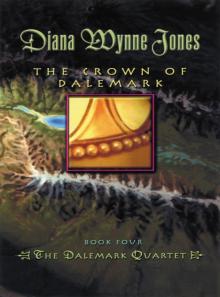 The Crown of Dalemark
The Crown of Dalemark Deep Secret
Deep Secret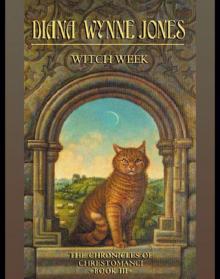 Witch Week
Witch Week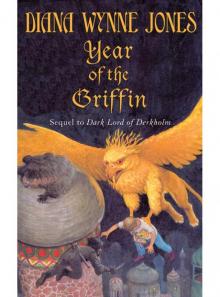 Year of the Griffin
Year of the Griffin Wild Robert
Wild Robert Earwig and the Witch
Earwig and the Witch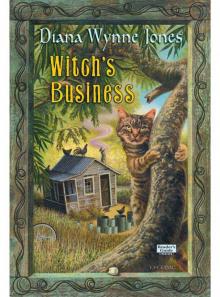 Witch's Business
Witch's Business Dogsbody
Dogsbody Caribbean Cruising
Caribbean Cruising Cart and Cwidder
Cart and Cwidder Conrad's Fate
Conrad's Fate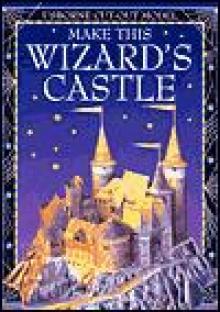 Howl's Moving Castle
Howl's Moving Castle The Spellcoats
The Spellcoats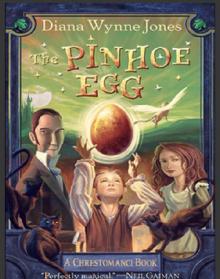 The Pinhoe Egg
The Pinhoe Egg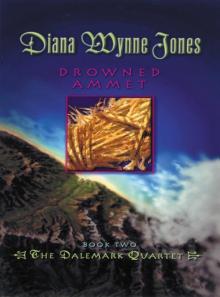 Drowned Ammet
Drowned Ammet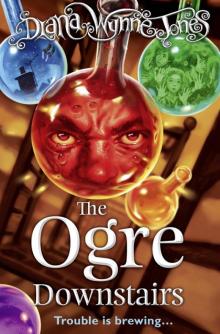 The Ogre Downstairs
The Ogre Downstairs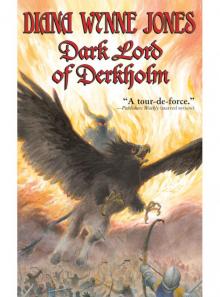 Dark Lord of Derkholm
Dark Lord of Derkholm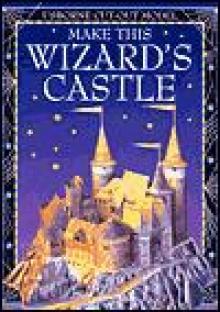 Castle in the Air
Castle in the Air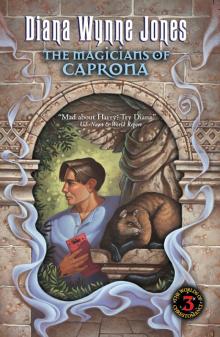 The Magicians of Caprona
The Magicians of Caprona A Tale of Time City
A Tale of Time City The Lives of Christopher Chant
The Lives of Christopher Chant The Magicians of Caprona (UK)
The Magicians of Caprona (UK)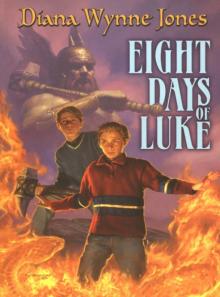 Eight Days of Luke
Eight Days of Luke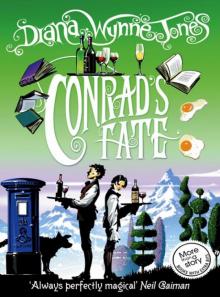 Conrad's Fate (UK)
Conrad's Fate (UK) A Sudden Wild Magic
A Sudden Wild Magic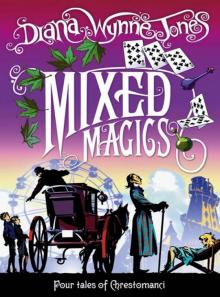 Mixed Magics (UK)
Mixed Magics (UK)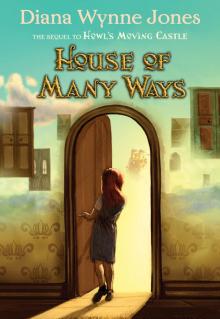 House of Many Ways
House of Many Ways Witch Week (UK)
Witch Week (UK) The Homeward Bounders
The Homeward Bounders The Merlin Conspiracy
The Merlin Conspiracy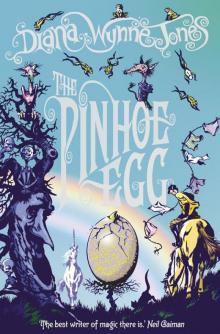 The Pinhoe Egg (UK)
The Pinhoe Egg (UK)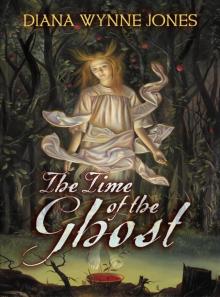 The Time of the Ghost
The Time of the Ghost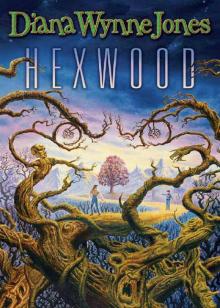 Hexwood
Hexwood Enchanted Glass
Enchanted Glass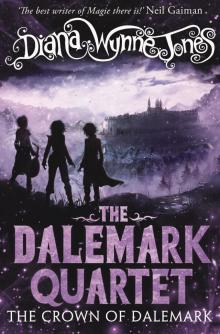 The Crown of Dalemark (UK)
The Crown of Dalemark (UK)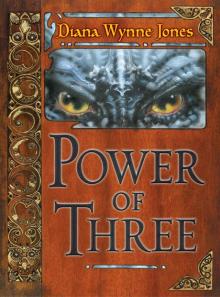 Power of Three
Power of Three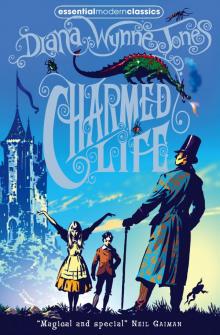 Charmed Life (UK)
Charmed Life (UK)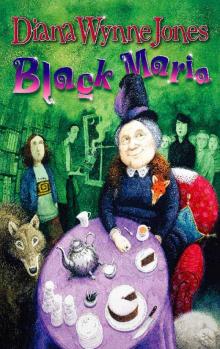 Black Maria
Black Maria The Islands of Chaldea
The Islands of Chaldea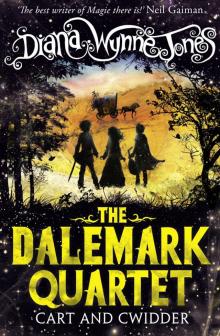 Cart and Cwidder (UK)
Cart and Cwidder (UK) Drowned Ammet (UK)
Drowned Ammet (UK) Charmed Life
Charmed Life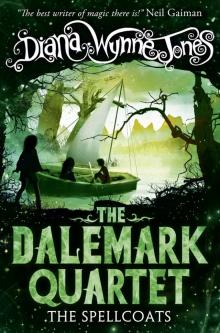 The Spellcoats (UK)
The Spellcoats (UK)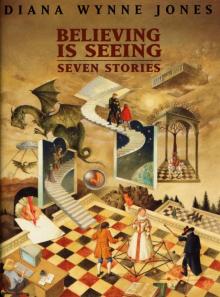 Believing Is Seeing
Believing Is Seeing Samantha's Diary
Samantha's Diary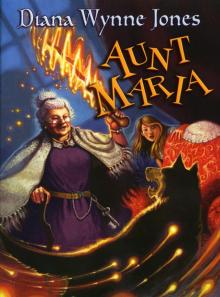 Aunt Maria
Aunt Maria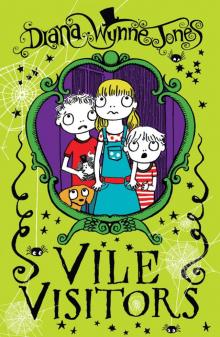 Vile Visitors
Vile Visitors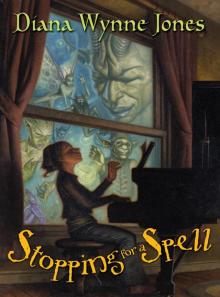 Stopping for a Spell
Stopping for a Spell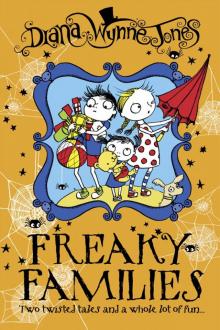 Freaky Families
Freaky Families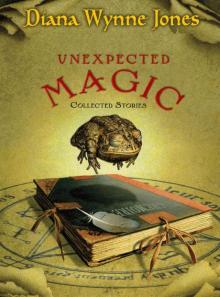 Unexpected Magic
Unexpected Magic Reflections
Reflections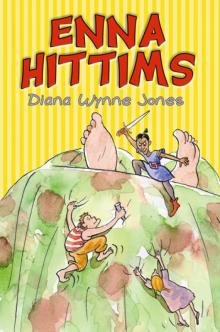 Enna Hittms
Enna Hittms Mixed Magics: Four Tales of Chrestomanci
Mixed Magics: Four Tales of Chrestomanci